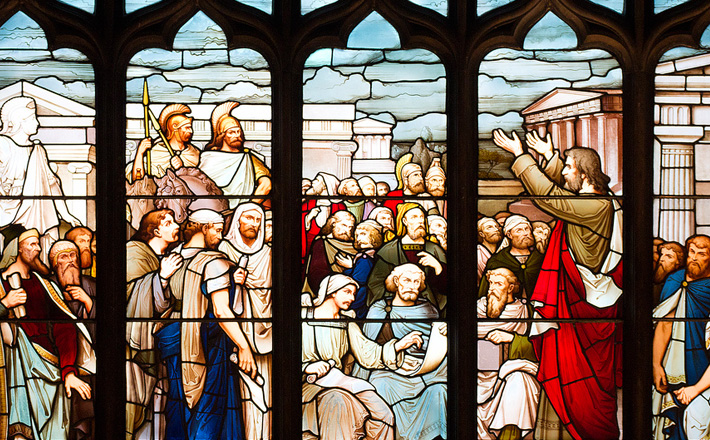Commentary on Acts 17:22-31
Last week, Stephen spoke to fellow Jewish believers; this time, Paul preaches in a decidedly foreign place.
Paul, the apostle to the Gentiles, preaches one of his most extensive sermons in a Gentile context. Of course, his letters are much longer and since he penned them, they provide us with a more accurate take on Paul than the construction of Paul provided by the composer of Acts. Nonetheless, this story does provide an account of how at least one of the early Christians, the author of Acts, navigated the task of being an apologist of the new movement.
No other passage of the New Testament more explicitly puts on display the challenge of an apologist: How does the faith flowering in this new movement relate to beliefs in the world around it, especially beyond the Jewish soil in which The Way’s first green blade appeared?
The section for today has layers of Paul that I will not dissect, but will note. The first is already mentioned. This is the Acts of the Apostles construction of Paul. This level (which I will call Acts’ Paul) is further complicated because within the narrative, that character is publicly describing himself in a highly crafted way. Paul’s speech to the Athenians is a selective portrayal of himself even within the understanding of Acts. He lifts up aspects of himself and his message, ignoring others that we encounter elsewhere in Acts.
In verse 22, Paul extols the city of Athens and its religious fervor. Paul, as presented in today’s Acts reading, is attentive and impressed by the widespread religious interests of his audience. However, we already know that he is not delighted in the religion of the Athenians; he is “deeply distressed” by this city’s over the top idolatry (17:16). That idolatry led him to go all about Athens and argue his case, causing some Greek philosophers to call him a babbler (17:18). He is brought to the Areopagus where his ideas, and perhaps he himself, are put on trial. The Athenians—at least Acts’ Athenians—claim to be curious about all things, especially those ideas new to them. They were accustomed to spending their time seeking novelty.
Paul makes his case to the Athenians by leaving the places where he feels comfortable—specifically idol-free landscapes—to meet them where they live. He speaks of what he has seen and appreciated, a pagan altar. He does not project his “deep distress,” but rather, joy at what he found in his careful search of the city. An altar bore an inscription: To an unknown god.
Stepping into their own confession of ignorance, Paul offers to make known to them what has been unknown. Paul begins not with the story of Jesus, nor even that of Abraham. His best hope for sympathy is to focus on the creational work of God. He proclaims God as a source and sustainer of all that is, whom no human construction could contain. Even as he begins to speak of what Israel has known of God, Acts’ Paul emphasizes that this God has already gifted the listening Athenians with something near and dear to them: life and breath. God gave each people their own time and place to dwell. The Athenians whose days were spent in idle conversation would undoubtedly appreciate a God who put them in that place and gave them such a pleasant life.
Acts’ Paul lauds the vocation of such people who spend their days seeking and even touching God. (“Groping” seems an unnecessarily negative translation). He argues that they have indeed made at least incidental contact with the divine because God is so close. Paul chooses as his proof text not a passage of Scripture, but a word from a Greek poet who describes God as the one in whom “we live and move and have our being” (17:28). The only time we have had an experience of living, moving, and having our being within another is when we inhabit our mother’s womb. And this image leads to a declaration that humans like both Paul and the Athenians are like offspring of the one in whom they had been carried.
Since they have their origin within God, Paul argues that this God who bore them must not be conceived as the work of human hands or inventive minds, but as a living being. Only after laying all of this groundwork does Paul make a specifically Christian claim. He asserts that this God has appointed a just judge who will clarify what has been unknown to the hearers. This appointed one can be trusted because God raised him from the dead.
When finally Paul makes the specifically Christian claim about resurrection, the crowd interrupts him with a mixture of indignity and interest. He never expounds on the mystery that happens in the twinkling of an eye nor does he testify to his encounter with the resurrected one on a Damascus road. He simply leaves Athens with a few more believers and with the rest of those at the Areopagus to muse on the ideas he has left them.
The apologists among us will note that Paul was wise in setting aside his own assumptions about what he found offensive in the Athenians’ beliefs and practices. We will celebrate each of the ways that Paul attempts to meet the Athenians within their own spiritual landscape. We will applaud his decision to begin with a recognition of shared origin in God. We will speak in ways that are different than when we speak to those of our own community. And we will then reveal Christ standing on the common ground we have established, offering new life. At times, we will take leave of our hearers, entrusting them to God who may bring to fulfillment the promising possible avenues of thought we have opened up.


May 17, 2020